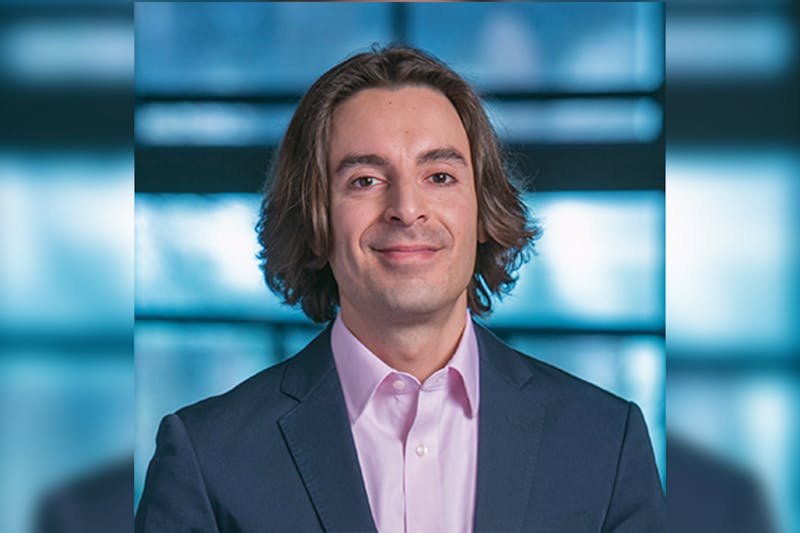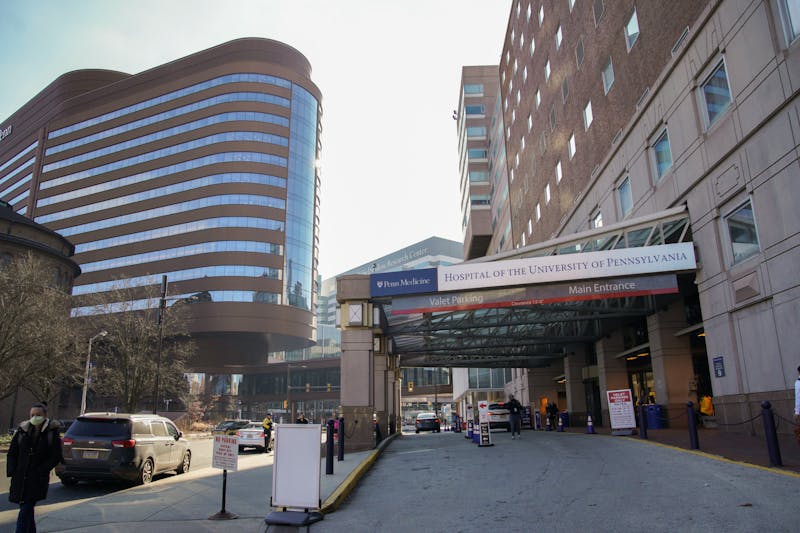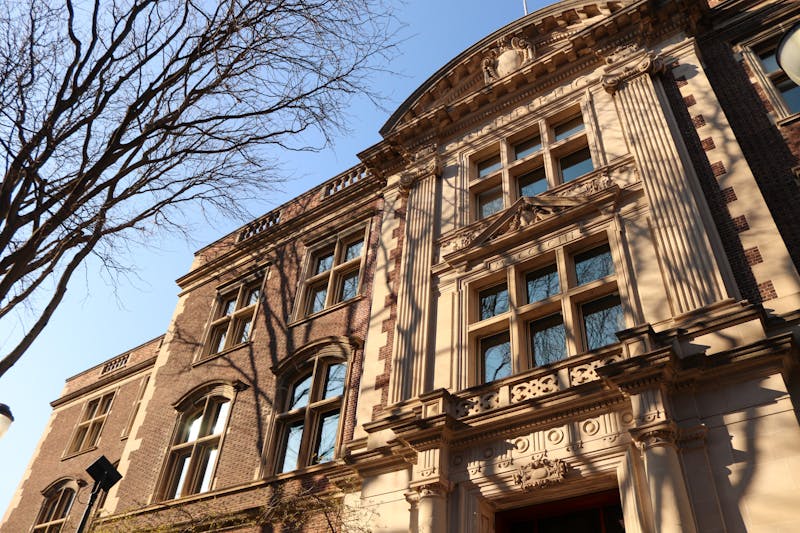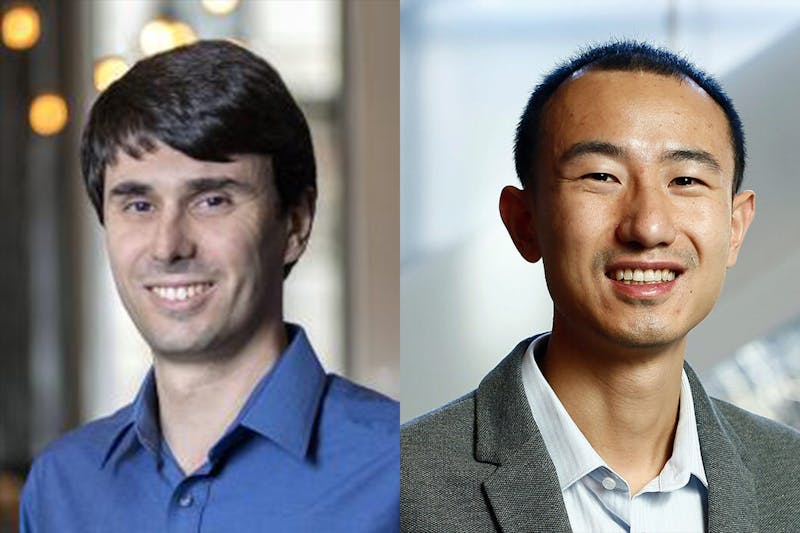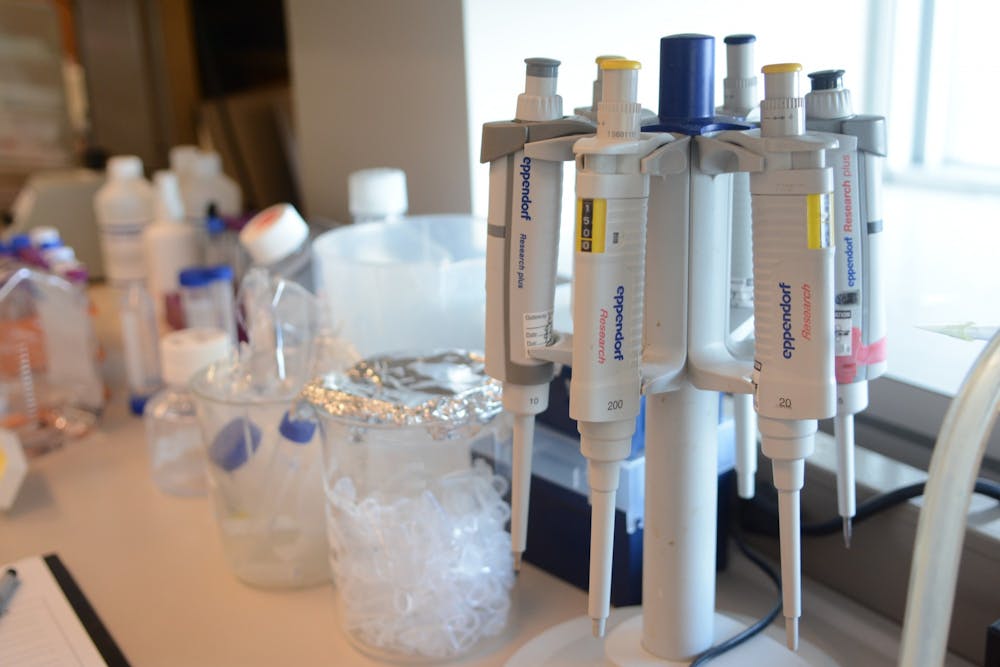
Penn researchers David Fajgenbaum and Grant Mitchell secured a $48 million White House grant for their biotech non-profit Every Cure.
Credit: Serena JankovicPenn researchers received a $48 million grant from the White House for artificial intelligence-powered research that matches existing drugs to rare diseases without a treatment.
Every Cure is a nonprofit biotech company that was inspired by David Fajgenbaum’s personal story: in his third year of medical school, Fajgenbaum was diagnosed with Castleman disease, which nearly killed him five times.
“If I didn’t find a drug, I wasn’t going to survive,” he recalled thinking.
Fajgenbaum's co-founder, Grant Mitchell, was his roommate at the time of his diagnosis. Both were pursuing medical degrees from the Perelman School of Medicine and MBAs from the Wharton School.
“The only hope was to begin testing drugs on him to hope that we can repurpose an existing drug," Mitchell said. “We were able to find a drug that ultimately led to his remission.”
Through extensive research and experimentation, Fajgenbaum found a way to repurpose a drug made for organ transplant rejection to treat his rare disease, a discovery that led him and Mitchell to inquire if other rare diseases may be able to be cured by drugs already being used to treat other diseases.
Mitchell’s background in drug repurposing research with McKinsey & Company along with Fajgenbaum’s personal experience in finding an existing drug that treated his own disease were essential to creating Every Cure.
“The interesting part about that experience was that the science was definitely needed, but we also needed the stakeholder management capabilities,” Mitchell said.
In the last 10 years, Every Cure has identified 17 different drugs that can be used for diseases they weren’t intended for.
“Our goal is to help as many people as possible with drugs that are already sitting at the pharmacy counter," Fajgenbaum said. “And the way we do that is we use an AI algorithm to help us figure out what is likely to work.”
Every Cure helps identify “which drugs can have the greatest impact on patients across the whole landscape of drugs and diseases,” according to Mitchell.
Sally Nijim, an M.D. candidate at Penn and the chief of staff for Every Cure, explained how Every Cure’s mission is different from that of most pharmaceutical companies.
“I think one of the greatest things about Every Cure being a nonprofit is that we're thinking about [drug-disease] pairs that don't necessarily have the highest commercial viability, but are impactful in their own way,” Nijim said. “My experiences at Penn have been influential for everything I have been involved in at Every Cure, from building infrastructure at a ground level in our earlier stages to leading on biomedical prioritization of drug-disease pairs and strategy. Penn has been pivotal in advancing the type of data-driven repurposing [that] Every Cure is doing at large.”
Nijim wrote to The Daily Pennsylvanian about the multistage process of constructing a system for prioritizing drug-disease pairs. She explained that priority is based on biological promise, how feasible a drug can be translated to patients, and which drug-disease pairs would have the largest impact.
“I like to think about this impact-layered approach we are building as a ‘rescue’ for promising drug-disease pairs that have been missed, often due to market factors, so they can actually reach patients,” Nijim said.
Every Cure utilizes biomedical knowledge graphs that represent known disease mechanisms and pathways. According to Fajgenbaum, the knowledge graph for Every Cure consists of 70 different databases integrated together into one massive database.
“Biomedical knowledge graphs allow us to mine these connections between drugs and diseases … and that’s what really launched our latest thinking in terms of using artificial intelligence and machine learning to make these connections, build these hypotheses, and then validate them so they can get to patients,” Mitchell said.
AI algorithms are applied across all drugs, diseases, proteins, and genes to find connections. The Every Cure software generates a percentage score of the likelihood that a drug treats another disease by seeing if the pattern looks similar to the known drug-disease matches. The higher the score, the likelier the existing drug will work for the given disease.
AI significantly decreases the time it would take to measure all signaling molecules, cytokines, and messaging molecules that can help determine how drugs interact in biological pathways.
“Artificial intelligence can look across all drugs and all diseases relatively instantly compared to the 22,000 years it may take to manually go through everything,” Fajgenbaum said.
The AI algorithm uses the same model that is used by Netflix to predict the next movie that you might want to watch. Every Cure’s drug-disease scoring system is reliant on having large databases from multiple sources that are frequently updated. Fajgenbaum is hopeful that drug companies and hospital systems will share their data.
“If you want to build the world’s best artificial intelligence platform, in order to make these predictions, you need the world’s best data set. And in order to build the proper data set, you need to be collaborative and non-competitive and work with existing players in the ecosystem,” Mitchell said.
Every Cure agreed to a contract for $48.3 million over the next three years via funding from the Biden-Harris administration as a part of the Advanced Research Projects Agency for Health. At the very end of this contract, Every Cure will deliver 20 to 25 of their greatest repurposing opportunities back to the United States government with the hope that it will support studying those further, according to Fajgenbaum.
While Every Cure’s algorithm can act as a starting point for determining which drug-disease pairings are most promising, performing clinical trials is most important to ensure that a drug is effective.
“What's so great about Every Cure is that it's becoming this hub where you could have researchers and stakeholders from different backgrounds gather in order to assess and systematize a system that previously had not been systematized before. And that system really benefits those that are lost in the cracks,” Nijim said.
Fajgenbaum attributes many of his personal and professional successes to the immunologists, informaticists, and translational researchers at Penn.
“Penn has been such an incredible place to do the things that I’ve been able to do,” Fajgenbaum said. “I don’t think I could have done them anywhere else in the world.”
The Daily Pennsylvanian is an independent, student-run newspaper. Please consider making a donation to support the coverage that shapes the University. Your generosity ensures a future of strong journalism at Penn.
Donate







